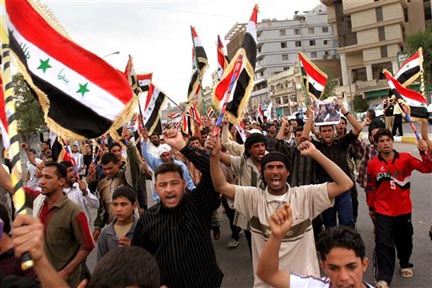 After months of tough negotiating over a pact that Bush thought would be pretty easy, it looked like a deal would come out a few days ago. The Iraqi executive branch had agreed to a 2011 withdrawal timeline with the ability to renegotiate and extend the timeline every year.
After months of tough negotiating over a pact that Bush thought would be pretty easy, it looked like a deal would come out a few days ago. The Iraqi executive branch had agreed to a 2011 withdrawal timeline with the ability to renegotiate and extend the timeline every year.The announcement of the basics of the pact by the Iraqi government led to a wave of protests--mostly by Al-Sadr supporters--against the pact, complete with American flag-burning and other anti-American slogans. Soon after, hardcore extremist sections of the Iraqi parliament declared they'd vote the bill down without new concessions--an elimination of the ability to renegotiate, and less legal protection for US troops in Iraq (from Iraqi law). The bill won't pass without their support. The US government will have to negotiate again.
It is unclear to me whether the Shiites are going to stop here or not. The US must have a pact by December, and the Shiites know that. Many of them (including the influential Al-Sadr) would be happy to see the Americans go. But if they said that they'd be unwilling to vote for any sort of security pact with the US, they would likely appear too extreme to work with the Iraqi government. They may simply stall until December comes. They may also be stalling until they get a very-temporary pact, one that extends the US stay for 6 months while negotiations continue. Why? If the pact is signed on time, it will be before the new US president. But with all signs pointing to a win by Mr. Obama, who is well-known in Iraq for his anti-war voting and rhetoric, Iraqi Shiites may try to game the pact such that President Obama is the final negotiator on the US side in order to maximize their concessions. They may also be trying to use brinksmanship on the pact, and push it until December before they agree to it, hoping to milk the current US administration for concessions as they desperately try to get something reasonable signed before the deadline passes and the administration loses power.
It's also possible this is the extent of Shiite expectations. It's tough to tell.
There's one good sign in all of this: much of the rhetoric by lawmakers and marchers is very pro-Iraqi. They are emphasizing their desire for sovereignty and national freedom, which will ultimately be a uniting factor. Hopefully, a big party will happen all over Iraq when the last US troop goes home, complete with Iraqi flags flying out windows. Nationalism is key to the success of a nation-building effort, and key to heal the wounds of a tough civil war. The US, which has done a wonderful job of absorbing blame in the past few decades, can stand to be the big-bad-wolf figure that creates an Iraqi nationalism that keeps the country together during its formative infant-democratic years.
No comments:
Post a Comment